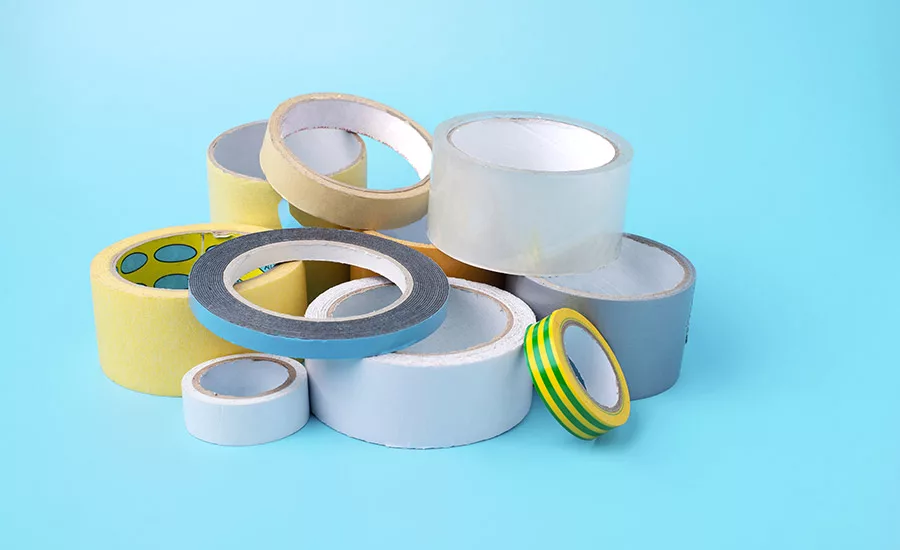Strategic Solutions
The Wonderful Wide World of (Pressure-Sensitive Adhesive) Tape
The pressure-sensitive tape market continues to expand, with global growth rates predicted to be over 6% through 2030.

Well over 30 years ago, within the first week of my then-budding career with a global pressure-sensitive adhesive (PSA) tape manufacturer, a sales colleague opened a presentation with the phrase, “Tape is my life.” Not only was that the first time I had ever heard those words, I also wondered a bit about my coworker’s seemingly unique worldview.
Decades later, I can easily relate to that bold statement, as tape indeed has turned out be a large part of my life as well. With the World Adhesive and Sealant Conference upon us, what does the world of tape look like today?
Growth Opportunities
One consistent hallmark of the global tape industry has been that of steady growth. Despite the challenges of COVID, supply chain issues, and a host of other difficulties, the pressure-sensitive tape market will continue to expand, with global growth rates predicted to be over 6% through 2030.
This increase is driven in part by pressure-sensitive tape’s high degree of functionality, which in turn often results in savings of time and money, quality improvements via enhanced performance, and improved aesthetics. In multiple examples across several markets, process improvements such as reduced preparation time and decreased downtime add to the overall value generated by pressure-sensitive tape use. In short, tape often presents the optimum tailor-made solution for many customers.
Because of these advantages, PSAs are well-positioned to tap into multiple emerging trends. With labor shortages affecting multiple markets, tape solutions offer ease of use and often enable a high degree of automation implementation.
In terms of environmental awareness, the tape market is a leader when it comes to implementing solvent-free adhesive solutions such as hot-melt and other solvent-free options. Building on the legacy of providing repulpable (water-soluble) adhesives to the traditional paper industry, tape manufacturers are increasingly offering water-based adhesives for more advanced applications in multiple end-use markets.
Aligning with the sustainability mantra of reduce, reuse, and recycle, look for the tape industry to continue to innovate. One emerging technology field is literally going back to nature to develop bio-inspired adhesives. Some of these products are loosely based on van der Waal’s forces, utilized in the natural world by the gecko, among others. Such adhesives not only allow for ease of initial application but subsequent repositioning and reuse, which has the impact of not only providing a secure bond but one that is repeatable and therefore reduces the need for additional material.
The boom in e-commerce certainly has driven an increase in demand in the packaging and adjoining industries, where tape often plays a key role both in process and end use. Pressure-sensitive tape often helps achieve lightweighting targets by replacing heavier mechanical solutions. Finally, did you know that it is actually possible to “tape” an entire residential or commercial building envelope utilizing pressure-sensitive air barrier technology?
Industry Challenges
The industry does indeed face several of the same threats confronting multiple markets today, among them rising input costs, supply chain volatility, and availability of labor. All of these factors will drive tape manufacturers to initiate process improvements where possible, rethink and potentially shorten supply chains, and partner even more closely with suppliers.
On the regulatory front, the tape industry in North America is at the forefront of looking to expedite the reduction of hazardous air pollutants (HAPs), driven by Title III of the Clean Air Act Amendment. With the U.S. Environmental Protection Agency (EPA) scheduled to review current pollutant floor levels, all web coating operations in the U.S. (including tape manufacturing) will have Maximum Achievable Control Technology (MACT) emissions testing required by 2023.
At the state level, California Proposition 65 requires close attention for companies that wish to manufacture or sell product in the state. Internationally, European REACH compliance requires consistent monitoring, with a most recent call there for restrictions on the use of mid-chain chlorinated compounds (MCCPs). All key tape manufacturing regions of the world (North America, Europe, and Asia) offer unified pressure-sensitive tape industry associations that help members navigate the regulatory maze in their respective areas.
Wide-Ranging Solutions
While tape may not be your life, perhaps you could consider how it could become a potential solution to a problem you may be facing or a means to improve a process you are responsible for. Experts throughout the PSA value chain would be glad to speak with you and explore potential opportunities.
For more information, call (513) 469-7555, email info@chemquest.com, or visit www.chemquest.com.
Note: Opening image courtesy of Yaroslav Litun via www.gettyimages.com.
Looking for a reprint of this article?
From high-res PDFs to custom plaques, order your copy today!




.webp?height=200&t=1686719566&width=200)